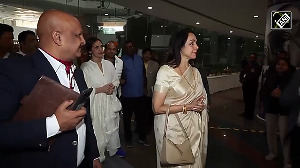One of the persisting complaints about Indian elections among the educated classes has been that there is really not much engagement between them and active politics.
"Why don't we see more of honest, dedicated professionals in Parliament? Why are there not enough fresh faces, young blood to energise decaying grey cells and jaded ideas?"
Election 2004 offers interesting answers to the questions. It has a larger and more highly visible quotient of younger people as candidates.
True, the majority are children of politicians, which has revived the old debate of dynastic succession in politics. Yet the likes of Rahul Gandhi, Sachin Pilot, Milind Deora, Sandeep Dixit, Dushyant Singh, Akhilesh Yadav, Manvendra Singh, Jitin Prasad, S Bangarappa's sons and K Karunakaran's son and daughter do represent a new generation. (The list of politicians' close kin actually extends to just about 40 candidates).
But why is their political parentage held against them and such a fuss made? If we see nothing odd in the sons and daughters of businessmen, filmmakers and movie stars, doctors, architects, accountants or musicians following in the professions of their parents, what's wrong with political progeny continuing in a time-honoured (some will say time-dishonoured) tradition?
In industry and allied professions it is in the natural scheme of things that the inheritors continue in a line of work the family has specialised in; in the annals of classical Indian music, the word gharanedar implies the upholder of a valued tradition, someone who brings special merit by virtue of a combination of genes, training and family association.
In everyday skills and services -- from the village weaver to the corner grocery shop owner -- the children will inherit. It's considered perfectly normal.
The argument against political dynasties is that they mitigate against the spirit of equal representation in a democracy, by giving sons and daughters an unfair advantage over others and block the democratic functioning of political parties.
Implicit in the criticism is that the business of politics is not the same as running a family firm or private fief; looming over the argument is the shadow of the Nehru-Gandhi dynasty, which will soon be putting its fourth generation MP in.
In fact, the argument seems a little outdated today. Many scions of active politicians do appear to have other choices; armed with an education and professional training they could have got ahead in non-political careers.
Why should we disbelieve a Rahul Gandhi, Sachin Pilot or Sandeep Dixit's stated convictions, when they say that they have joined up because they can make a difference. After all, Indira Gandhi's arrival on the political scene in the 1960s seemed innocuous but her staying power changed the face of Indian politics.
More recently, unexpected inheritors such as Naveen Patnaik and Vasundhara Raje -- whom sceptics dismissed too easily in their early days -- have shown true grit despite the odds and proved the doubters wrong.
Among a younger generation, Mehbooba Mufti and Omar Abdullah, both from established political dynasties of Kashmir, have succeeded in making an impact.
Politics, like any other profession, requires special talents for survival -- in some respects it may be more, not less taxing. According to a recent estimate 60 per cent of sitting MPs are unlikely to be returned to the new Lok Sabha.
Hanging on in politics is therefore harder than in other jobs. Which is why -- with the remarkable exception of someone like Sunil Dutt -- most film and TV stars usually end up as one or two-time MPs.
Although the current dazzle of Govinda, Dharmendra, Moushumi Chatterji and Smriti Irani may seem great, it is transient. It brings a modicum of colour to an otherwise drab political landscape but it takes more than celluloid stardom to make a political star.
More interesting are candidates making a political choice because their careers have made activists out of them. Filmmaker Prakash Jha, who is standing from Bettiah in Bihar or former IAS officer Arun Bhatia (from Pune) have consistently fought a battle against corruption in public life.
They have now thrown their lot in to test the political status quo established by old-guard politicians. They may not win, but symbolically their conviction counts.
Those who dismiss the general election of 2004 as lacklustre because its results may be a foregone conclusion should look again. There is enough that is new and bold to keep every voter engaged.





